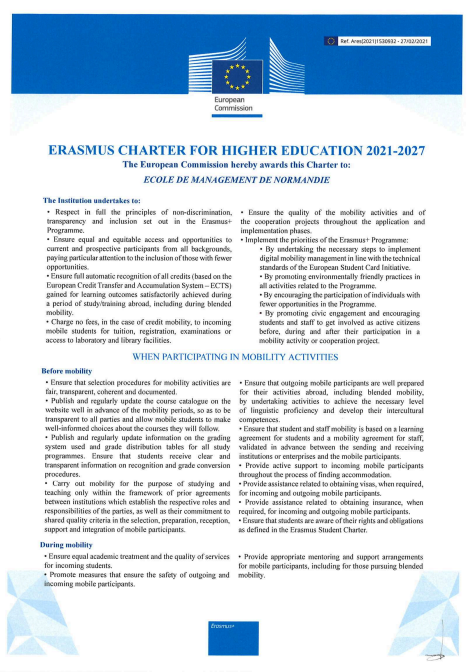

Study abroad
Erasmus+ Programme

- What is Erasmus +?
- The Erasmus + programme
- Obtaining the Erasmus + grant
- Grant amount
- Students with disabilities
- Internships
- Procedure to follow before going to study abroad
- Why going abroad?
Erasmus+
is the European Union's programme for education, training, youth and sport in Europe. Erasmus + offers millions of Europeans the opportunity to study, train and gain experience abroad.
The 2021-2027 programme has a strong focus on social inclusion, ecological and digital transitions and promoting the participation of young people in democratic life.
It supports the priorities and activities defined in the European Education Area, the Digital Education Action Plan and the Skills Strategy for Europe.
The EM Normandie strategy for this scheme is based on the EM Normandie Global Erasmus Strategy Statement 2021/2027.
The countries participating in the programme are:
- European Union member states
- Iceland, Liechtenstein, Norway, Turkey, Former Yugoslav Republic of Macedonia
Please note: Switzerland is no longer in the programme.
And partner countries:
- European Neighbourhood countries to the East (Armenia, Azerbaijan, Belarus, Georgia, Moldova, Ukraine) and to the South (Algeria, Morocco, Tunisia, Libya, Egypt, Palestine, Jordan, Israel, Lebanon, Syria), the Western Balkans (Albania, Bosnia and Herzegovina, Kosovo, Montenegro), the Russian Federation
- Countries around the world: America, Asia, Africa-Caribbean-Pacific area
What is Erasmus +?
Erasmus + is the European Union's programme for education, training, youth and sport in Europe. Erasmus + offers millions of Europeans the opportunity to study, train and gain experience abroad.
The 2021-2027 programme has a strong focus on social inclusion, ecological and digital transitions and promoting the participation of young people in democratic life.
It supports the priorities and activities defined in the European Education Area, the Digital Education Action Plan and the Skills Strategy for Europe.
The EM Normandie strategy for this scheme is based on the EM Normandie Global Erasmus Strategy Statement 2021/2027
The countries participating in the programme are:
- European Union member states
- Iceland, Liechtenstein, Norway, Turkey, Former Yugoslav Republic of Macedonia
The countries participating in the programme are:
- European Neighbourhood countries to the East (Armenia, Azerbaijan, Belarus, Georgia, Moldova, Ukraine) and to the South (Algeria, Morocco, Tunisia, Libya, Egypt, Palestine, Jordan, Israel, Lebanon, Syria), the Western Balkans (Albania, Bosnia and Herzegovina, Kosovo, Montenegro), the Russian Federation
- Countries around the world: America, Asia, Africa-Caribbean-Pacific area
The Erasmus+ programme
This programme gives you the opportunity to study in another European country for a period of 2 to 12 months. The receiving organisation and EM Normandie must sign an Erasmus+ agreement.
Students on the programme benefit from the following:
- A period of study that counts towards their EM Normandie degree with the ECTS credit system. You must choose Business Studies modules (30 ECTS / semester) as stipulated in the inter-institutional agreements signed by EM Normandie and partner universities
- No registration fees at the host university. However, miscellaneous costs (administrative, societies, insurance, transport, etc.) may be requested by the receiving organisation
Obtaining the Erasmus+ grant
All eligible students will receive by email a procedure to finalise their application.
- Mobility agreement
- Arrival Form
- Learning Agreement
- Bank details slip (RIB) in the student’s name
- Certificate of attendance
- Academic transcript from the host university
- Erasmus+ survey « EU Survey » after the expatriation
Students who fail to meet the deadlines or submit all supporting documents will be automatically removed from the list of scholarship recipients. You may be required to repay the full amount of your scholarship if you fail to comply with the rules and deadlines.
- Group 1: Countries with a higher cost of living
Austria, Belgium, Denmark, Finland, Germany, Iceland, Ireland, Italy, Liechtenstein, Luxembourg, Netherlands, Norway, Sweden
292 € - Group 2: Countries with an average cost of living
Cyprus, Czech Republic, Estonia, Greece, Latvia, Malta, Portugal, Slovakia, Slovenia, Spain
225 € - Group 3: Countries with a lower cost of living
Bulgaria, Croatia, Hungary, Lithuania, Northern Macedonia, Poland, Romania, Serbia, Turkey
225 €
A one-off flat-rate contribution towards travel costs will also be paid to the student, calculated as follows:
- Between 10 and 99 km
Eco-friendly travel* : €56
Non eco-friendly travel : €28 - Between 100 and 499 km
Eco-friendly travel* : €285
Non eco-friendly travel : €211 - Between 500 and 1999 km
Eco-friendly travel* : €417
Non eco-friendly travel : €309 - Between 2000 and 2999 km
Eco-friendly travel* : €535
Non eco-friendly travel : €395 - Between 3000 and 3999 km
Eco-friendly travel* : €785
Non eco-friendly travel : €580 - Between 4000 and 7999 km
Eco-friendly travel* : €1188
Non eco-friendly travel : €1188 - 8000 km or more
Eco-friendly travel* : €1735
Non eco-friendly travel : €1735
*Eco-responsible travel includes outward and return journeys by train, bus or carpool
The Erasmus+ grant will be paid within the following time limit, as indicated in the final certificate of attendance:
- 6 months maximum for an academic semester
- 12 months maximum for full academic year
- 3 months maximum for an internship abroad
The student will receive 1 or 2 payments according to the following rule:
- The first instalment corresponds to the following lump sum
- Group 1
Semester: 1 036€
Full academic year: 2 590€
Internship: 728€ - Group 2
Semester: 896€
Full academic year: 2 240€
Internship: 658€ - Group 3
Semester: 756€
Full academic year: 1 890€
Internship: 588€
- The 2nd instalment (optional) depending on the duration mentioned on the final certificate of attendance
The above amounts are valid only for the academic year 2025/2026, subject to the allocation by the Erasmus+ Agency and are subject to change.
Students who choose to study abroad at the following destinations are not eligible for the Erasmus+ grant:
- Destinations in Europe with tailored courses
- EM Normandie's campuses abroad (Oxford, Dublin, Dubai)
- Certain non-Erasmus European destinations (see information sheets)
Students with disabilities
A flat-rate "support for inclusion" financial supplement of EUR 250 per month is allocated to encourage the participation of people who meet one of the following criteria:
- The student must register themselves as disabled with the International Affairs Cooperation Department before going abroad.
Criteria with a disability or long-term condition (ALD)
Supporting documents: Certificate of decision from the MDPH or certificate of long-term illness or disability card or other proof validated by the EM Normandie’s Inclusion Department.
Criteria with higher education grant holder on social criteria, grades 6 and 7
Supporting documents: Notification of national scholarship award
Interships
Students participating in traineeships will receive, in addition to the contribution to living expenses from their Erasmus+ grant, a financial supplement of €150 per month.
Students with fewer opportunities who participate in traineeships can benefit from both the inclusion supplement (€250 per month) and the traineeship supplement (€150 per month).
Procedure to follow before going to study abroad
- Register to the institution with the help of the International Affairs department
- Ensure that you have a valid ID
- Apply for you European Heatlh Insurance Card
- Take out additional insurance (strongly recommended for study visits and mandatory for internships) including at least medical expenses, hospitalization, repatriation assistance, civil liability, loss or theft of documents, travel tickets and luggage.
Why going abroad? ?
Going on a study trip abroad or doing an internship in a company will allow you to progress in learning a foreign language, to acquire new skills (hard & soft skills) but also to develop your network.

Charte ERASMUS + 2021-2027
News
See all the news-

#BeParisianForADay: an integration day in Paris for international students from…
25 September 2024
-

French and international students: take part in EM Normandie Business School…
26 March 2024
-

A royal day at the Château de Versailles for EM Normandie Business School's…
18 October 2023
-

The Sulitest international initiative gains momentum, raising €1.5 million to…
26 March 2024
